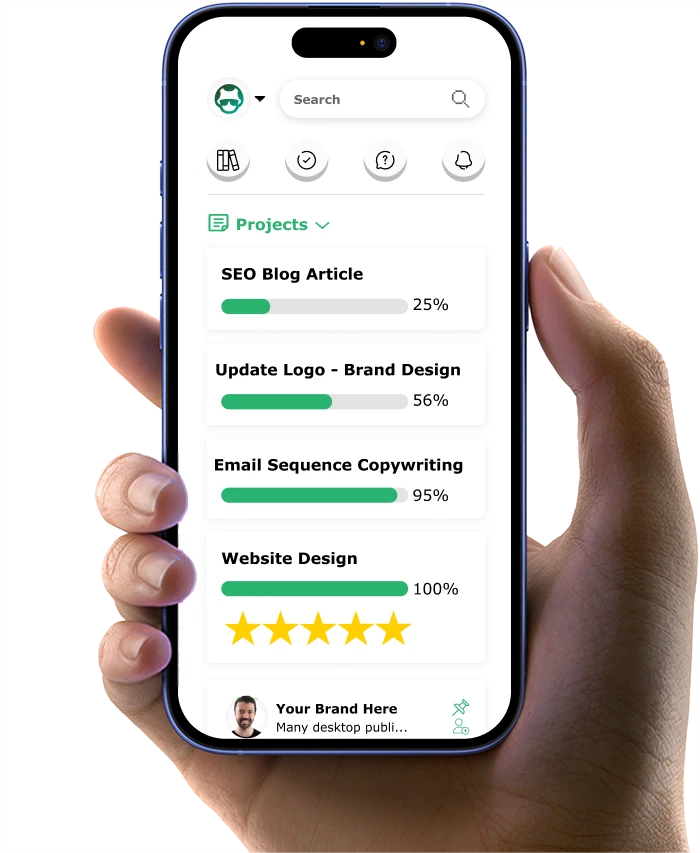9 Types of Social Media Marketing That Get Results Fast

Remember when social media marketing seemed simple?
Post regularly, use hashtags, and watch your business grow. Ah, those were the days.
Fast forward to today, and I meet entrepreneurs like Adam who sells professional services (Adam is an “avatar” for many who are reading this). He dropped $10,000’s and many hours on social media marketing so far this year.
His results? Declining engagement and near-zero attributable sales.
"I feel like I'm throwing money into a black hole," he confessed. Here's the reality: while social media marketing can deliver a respectable $2.80 return for every dollar spent according to Keyhole, achieving these results isn't about working harder - it's about working smarter.
In this comprehensive article, you'll discover all 9 types of social media marketing, as well as:
- The viral marketing approach that helped Dollar Shave Club generate 12,000 sales in 48 hours
- Why 84% of B2B buyers are influenced by video content (and how to create videos that convert)?
- The promoted post strategy that delivered 876% return on ad spend
- How live streaming creates deeper customer relationships (with real metrics)
- A framework to choose the perfect social media marketing strategy for your specific business
- And by the way, type #9 is really interesting and underrated in terms of effectiveness, if you have the bandwidth for it…
Ready to transform your social media marketing from a money pit into a profit center? Here we go…
If you want to
The Revenue Opportunity in Social Media Marketing
Social media has transformed into a vital tool for businesses today. It's no longer just about connecting - these platforms now drive real business results.
The trend is clear in the numbers - with 54.5% of businesses planning bigger social media budgets next year based on HubSpot's 2024 Social Trends Report.
Companies are following the money here as social media marketing, according to Keyhole, has an average ROI of $2.80 for every dollar spent.
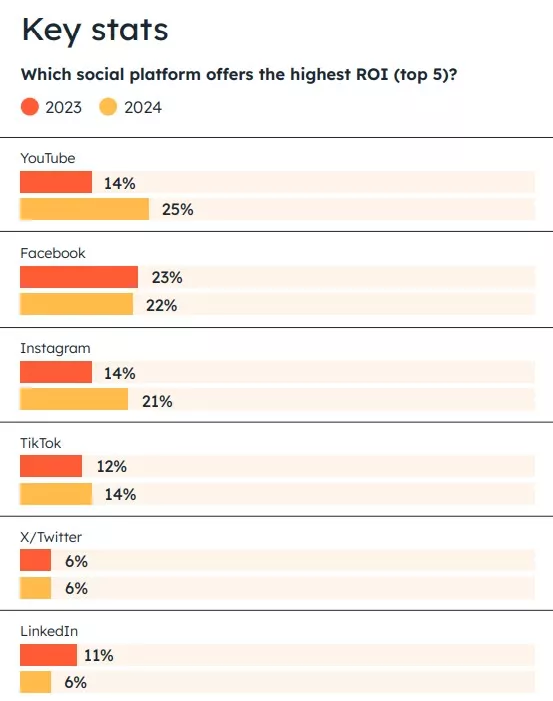
Studies by Sprout Social reveal that 78% of consumers are more willing to buy from brands they follow on social media, and 77% will choose a brand over its competitor after a positive social media interaction.
These statistics underscore the direct correlation between effective social media marketing and revenue growth.
What Should You Be Using Social Media For?
Well, a lot of things.
Remember, you’re not using social media just to promote your products or services. On average, you should only promote your offerings once every five or so posts.
The rest of the time, you can do the following:
- Show off your brand’s personality and culture.
- Respond to customer comments.
- Engage in conversations.
- Share interesting insights or facts.
- Invite users to share their own content.
On social media, your goal is to keep your brand in a positive light.
And you do that by reaching out to users on a regular basis and by providing valuable content.
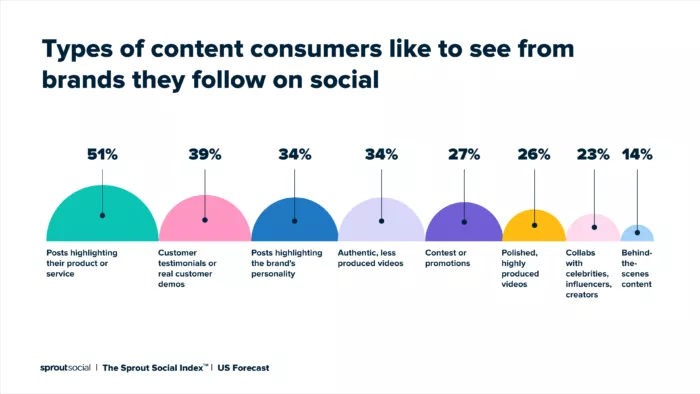
So it’s pretty clear that you need a social media presence.
But admitting that is the easy part.
Now you need to figure out how to actually be effective using social media.
With that, let’s take a look at the first type of social media marketing that your business can start using.
Type of Social Media Marketing #1: Organic Social Media Posting
What It Is
Organic posting content marketing is where you're not paying for distribution - you're just posting in the native format for free, unpaid. You're hoping to get some natural distribution from the platform algorithms while engaging people in your audience who are already following you and already liking your content.
Example to Illustrate Effectiveness
Similar to regular blog posts or videos like this, organic posting focuses on sharing your expertise, teaching something, sharing insights, and captivating your audience.
The goal is to establish authority through valuable content. For instance, you might share in-depth educational material that helps demonstrate your expertise in your field.
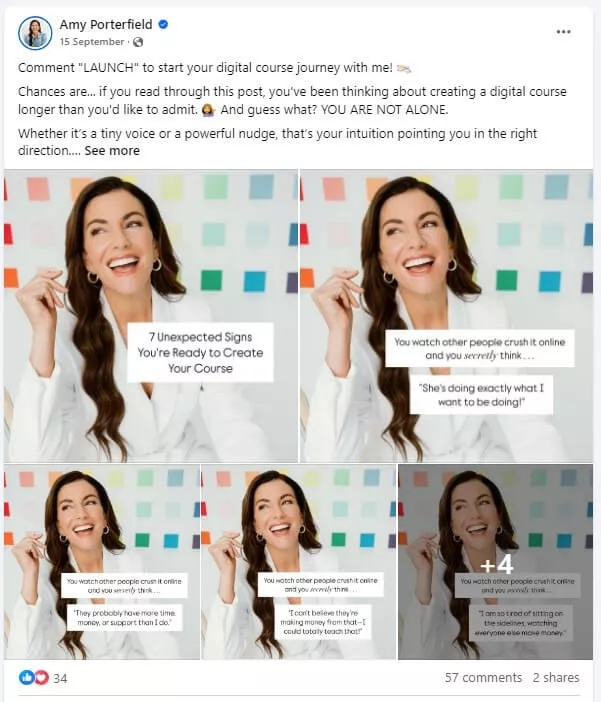
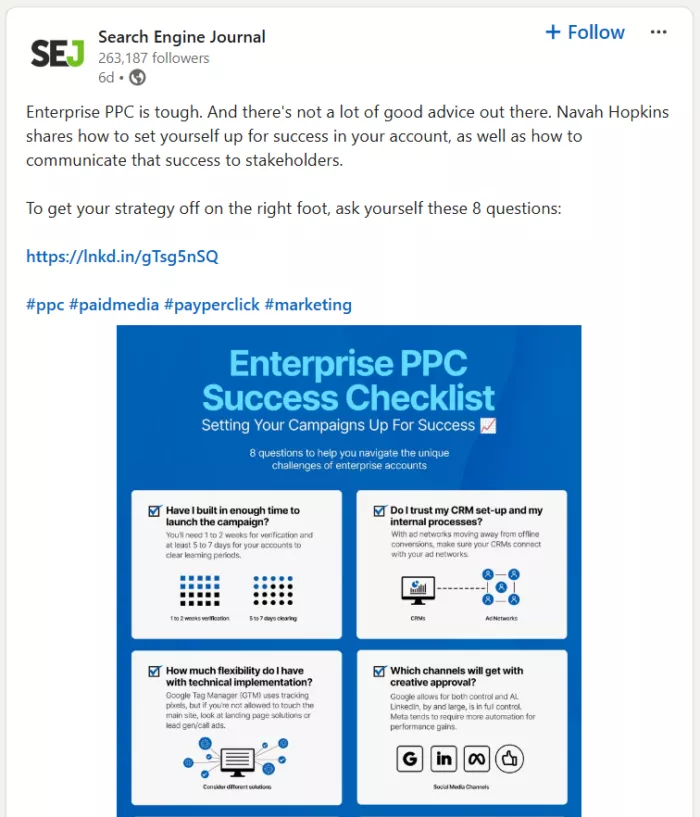
Best for Which Type(s) of Business?
This type of social media marketing is perfect for businesses looking to share their expertise, teach something valuable, and establish authority.
It's particularly effective for companies that want to engage with their existing audience who already follow and like their content, building deeper relationships through consistent value delivery.
Which Platform for This Type
- LinkedIn - Perfect for professional content, thought leadership articles, and industry insights. The platform's business-focused nature makes it ideal for B2B content, case studies, and company updates.
- Instagram - Excels at visual storytelling through photos, short videos, and Stories. Ideal for sharing behind-the-scenes content, product showcases, and culture-focused posts. The platform's various features (Feed, Stories, Reels) allow for creative content delivery that can humanize your brand.
- YouTube - Best for long-form video content, tutorials, and detailed explanations. The platform's search-friendly nature makes it excellent for educational content that has long-term value.
- Blog/Website Content - Serves as your content hub where you have complete control over presentation and user experience. Ideal for comprehensive guides, detailed case studies, and SEO-optimized content. Blog posts can be repurposed into smaller pieces for social media, creating a cohesive content ecosystem.
Potential Benefit
Organic posting delivers several key benefits:
- Helps share your expertise
- Allows you to teach valuable information
- Lets you share insights with your audience
- Helps captivate your audience
- Establishes authority in your space
- Engages people who already follow you
- Gets natural distribution through platform algorithms
- Builds deeper relationships with existing audience
The key to successful organic posting is consistency and providing real value. Instead of paying for reach, you're earning attention by sharing expertise and insights that genuinely help your audience. While this approach might take longer than paid strategies, it often results in stronger, more sustainable relationships with your followers.
Type of Social Media Marketing #2: Influencer Marketing
What It Is
Influencer marketing means partnering with social media influencers who have an audience you'd like to reach, or where there's meaningful overlap with your target market. These influencers then feature your product or service in their content.
Example to Illustrate Effectiveness
Influencers can feature your product in two ways:
1. Direct featuring: They might post a review about their experience with your product or service, often starting with receiving a free sample to test and share their thoughts.
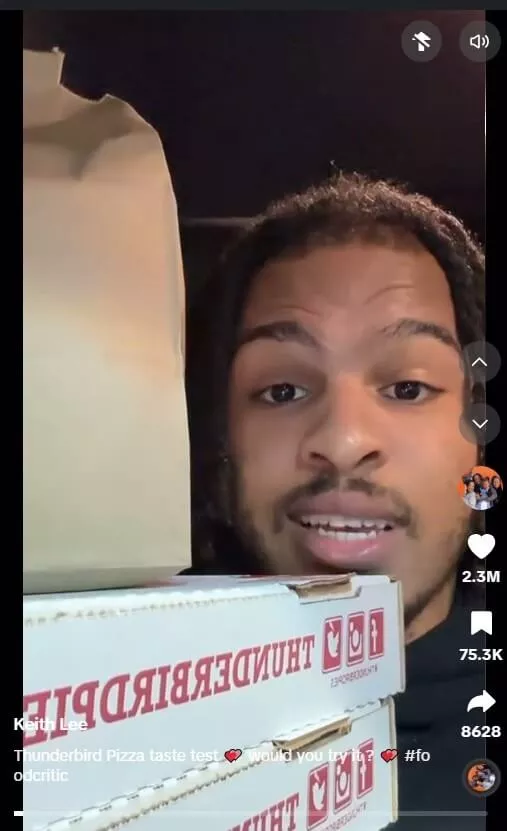
2. Indirect featuring: For example, a female influencer might be putting on makeup during a livestream, talking about something else, and casually mention "by the way, what I'm using is this brand right here" while holding it up to the camera.
Best for Which Type(s) of Business?
- Consumer Lifestyle Brands - Fashion, beauty, fitness, and wellness companies excel with influencer marketing due to their highly visual products and lifestyle appeal. These brands benefit from authentic product demonstrations and real-life usage scenarios that influencers can naturally showcase in their daily content.
- E-commerce Businesses - Online retailers across various niches can leverage influencers to demonstrate products in action and provide authentic reviews. This is particularly effective for products that benefit from detailed explanations or visual demonstrations.
- B2B Service Providers - Professional service firms, SaaS companies, and consultancies can partner with industry thought leaders and business influencers to build credibility. These partnerships often focus on educational content, case studies, and expert endorsements rather than traditional product showcases.
- Local Businesses - Restaurants, boutiques, and service providers can work with micro-influencers who have strong local followings. These partnerships can drive foot traffic and build community awareness through authentic, location-specific content.
The key is finding influential individuals whose audience and brand align well with the business's target customer.
Which Platform for This Type
The most common social media platforms for influencer marketing include:
- Instagram - Highly visual platform perfect for product and lifestyle content
- TikTok - Short-form video format well-suited for influencer collaborations
- YouTube - Allows for longer-form, in-depth sponsored content and reviews
- LinkedIn - Effective for B2B influencer partnerships and thought leadership
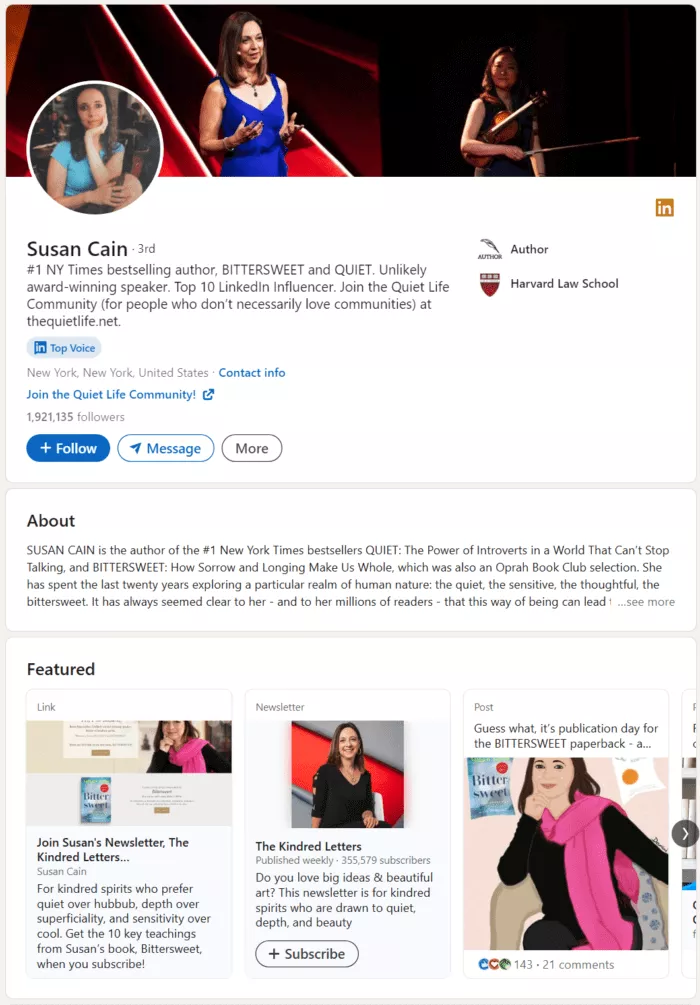
The specific platform should match where the business's target audience spends time and engages with influencer content.
Potential Benefit
The key benefits of effective influencer marketing include:
- Reaching new audiences
- Leveraging existing trust and credibility of influencers
- Getting your product featured either directly or indirectly
- Having your product integrated naturally into content
- Building trust through third-party endorsement
When executed well, influencer marketing can be a highly cost-effective way for businesses to reach and convert new customers through the power of social proof and third-party endorsements.
What It Is?
Video marketing is the creation and strategic distribution of video content across various social media platforms. This can include a wide range of video formats, such as product demos, explainer videos, behind-the-scenes clips, customer testimonials, and more.
Example to Illustrate Effectiveness
Dollar Shave Club's now-iconic viral video, which featured the brand's founder delivering a humorous pitch, led to 12,000 orders within just 48 hours of its launch.

This demonstrates the powerful impact that a well-executed, engaging video can have in driving immediate awareness and conversions for a business.
Best for Which Type(s) of Business?
Video marketing can be highly effective for businesses of all types, but it is particularly well-suited for:
- Educational Brands & Course Creators - Online learning platforms, coaching programs, and training companies can use video to deliver complex information in digestible formats.
- Product-Based Companies - Businesses selling physical products benefit from detailed demonstrations, unboxing videos, and how-to tutorials. This is especially powerful for tech products, home goods, or items that require assembly or have multiple features that need explanation.
- Service-Based Professionals - Consultants, agencies, and professional service providers can use video to explain complex processes, share client testimonials, and demonstrate their expertise through case studies.
- B2B Companies - Software companies, manufacturers, and enterprise service providers can use video for product demos, customer onboarding, and thought leadership content. Video helps simplify complex offerings and makes technical information more accessible and engaging.
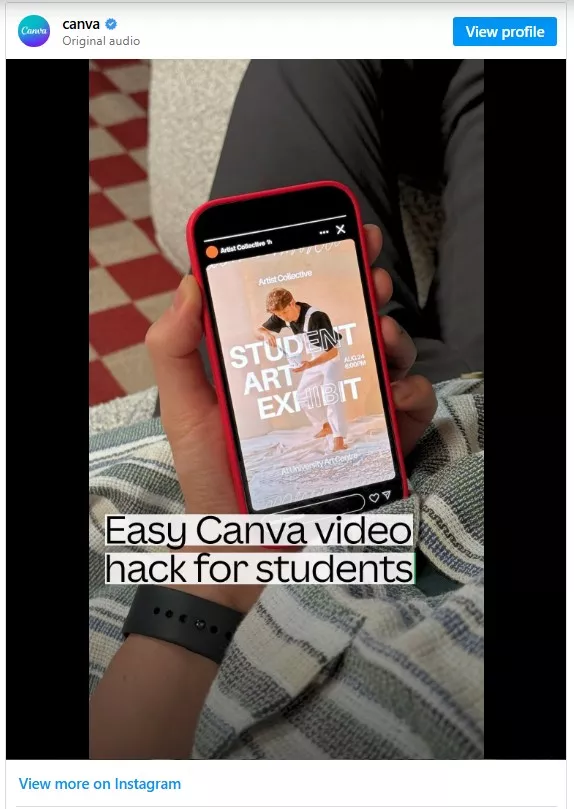
The key is creating video content that aligns with the target audience's interests and needs.
Which Platform for This Type
The most popular social media platforms for video marketing include:
- YouTube - The largest dedicated video platform, ideal for longer-form content
- TikTok - Rapidly growing short-form video platform, great for viral, trend-driven content
- Instagram Reels - Instagram's short-form video feature, allows for more polished content
- Facebook - Supports a variety of video formats and can leverage the platform's targeting
- LinkedIn - Effective for B2B video content, such as interviews or product demos
While our attention spans are generally short, the platform you choose should dictate your video length, with some platforms favoring longer content while others perform better with shorter clips.
Potential Benefit
According to a report by Wyzowl, 84% of people have been convinced to buy a product or service by watching a brand's video. The key benefits of a successful video marketing strategy include:
- Increased brand awareness and engagement through visually compelling content
- Higher conversion rates, as video can be more persuasive than static content
- Ability to showcase products, services, and brand personality in an immersive way
- Opportunities for organic and paid distribution to reach new, targeted audiences
- Creation of repurposable content that can be used across multiple channels
By incorporating video into their overall marketing mix, businesses can effectively capture audience attention and drive meaningful business results.
Type of Social Media Marketing #4: Social Media Ads
What It Is?
Paid ads on social media appear outside the normal flow of content like news feeds. These are advertisements that show up in designated areas where users expect to see ads. Think of them as advertisements that appear in specific sections of the platform where users are accustomed to seeing commercial content.
Example to Illustrate Effectiveness
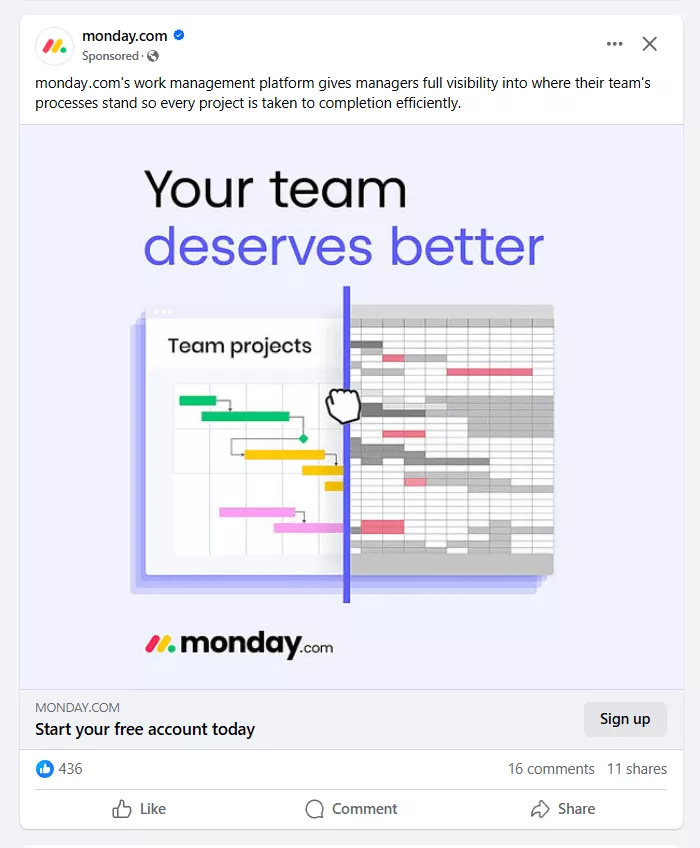
Best for Which Type(s) of Business?:
- E-commerce Businesses - Online retailers can target users at different stages of the buying journey, from discovery to purchase. Particularly effective for fashion, electronics, and lifestyle products where visual ads can showcase product features and create immediate desire.
These businesses benefit from retargeting capabilities to reach cart abandoners and previous site visitors.
- Digital Product Creators - Course creators, coaches, and information product sellers can use ads to promote lead magnets and build their email lists. Their success often comes from targeting specific pain points and offering free valuable content (like ebooks, webinars, or mini-courses) to attract qualified leads.
Which Platform for This Type
- Facebook and Instagram - These platforms are likely the top choices for sponsored posts. They offer robust targeting capabilities, diverse ad formats, and large user bases across both consumer and business audiences.
The ability to run ads natively in people's feeds makes Facebook and Instagram highly effective for sponsored content.
- LinkedIn - For B2B focused businesses, such as SaaS companies, digital agencies, and consulting firms, LinkedIn would be an excellent platform for sponsored posts. The professional targeting options and ability to reach decision-makers make LinkedIn ads very valuable.
- TikTok - The rapid growth of TikTok, especially among younger demographics, makes it an increasingly attractive platform for sponsored posts. The full-screen, native video ad formats on TikTok can be very engaging and impactful, particularly for eCommerce and consumer-facing brands.
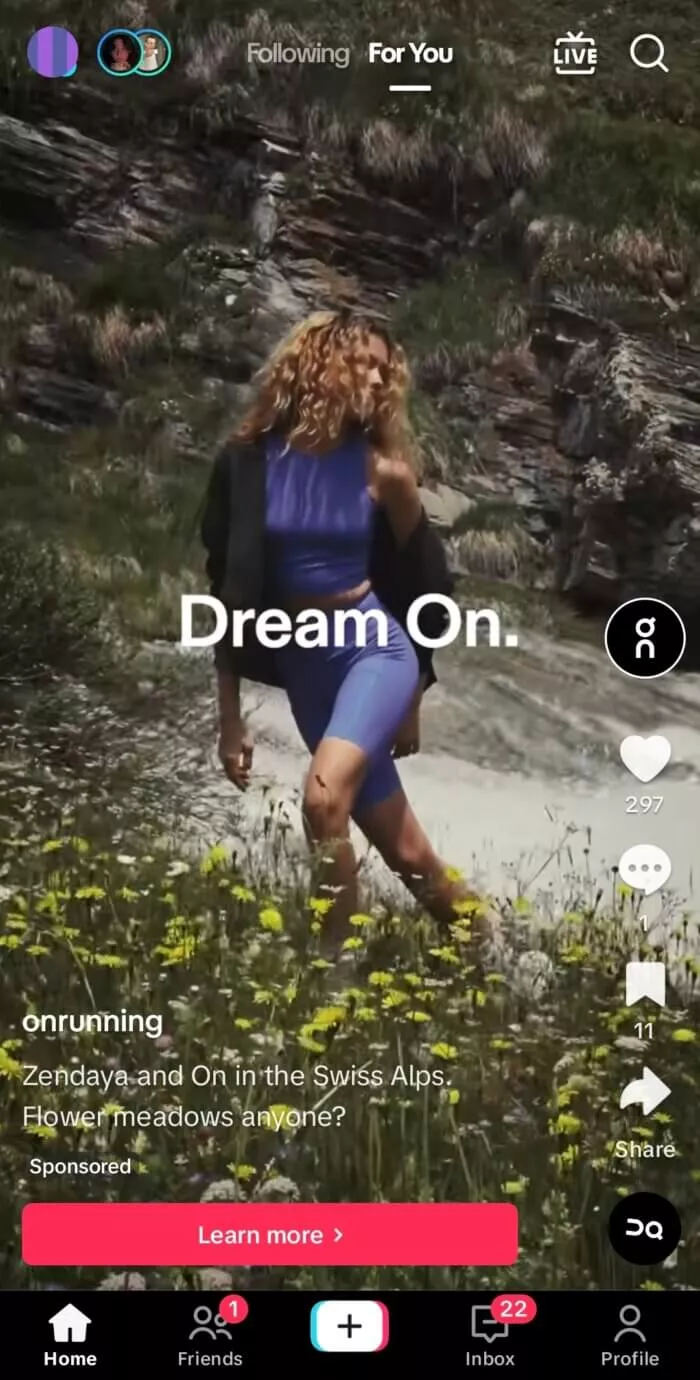
Potential Benefit
- Can work well when users have commercial intent
- Effective in spaces where users expect to see ads
- Users might specifically look in these areas when they're ready to buy
While users might have "ad blindness" in traditional ad spaces, they'll still look at ads when they have buying intent. The key is matching your approach to how users naturally interact with each platform.
Type of Social Media Marketing #5: Promoted Posts
What It Is
Paid promoted posts take a different approach from traditional advertising. These are advertisements that appear directly in your social media feed, like LinkedIn or Facebook, and are designed to blend seamlessly with regular content. Unlike traditional ads that appear in designated ad spaces, promoted posts become part of the natural flow of content that users scroll through.
Example to Illustrate Effectiveness
Think of promoted posts as marketing camouflage. They blend naturally with the content users are already consuming in their feeds. Instead of immediately pushing for a sale, these posts take a softer approach. They might start with valuable content that matches the platform's usual posts, then gradually guide viewers toward your business offering through a gentle, natural progression.
Virtual Summit Mastery, a company that provides online training, saw a 876% return on ad spend by using Facebook-sponsored ads to promote their content. In addition, they were able to gain 769 new email subscribers through their promoted post campaign.
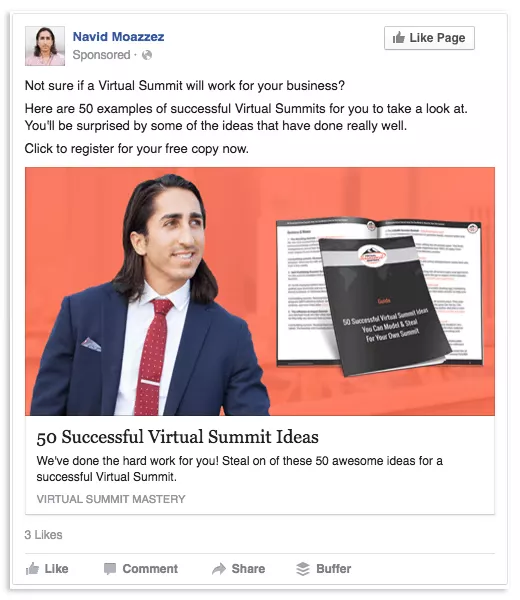
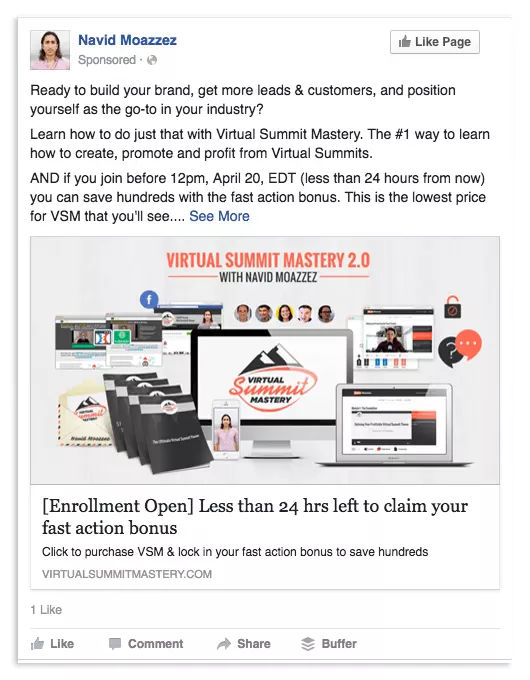
Best for Which Type(s) of Business?
For businesses that need a softer approach rather than direct selling, especially when:
- You're just starting out with social media advertising
- You want your content to blend naturally with the platform
- You're looking to move people gradually down your sales funnel
The key is ensuring the promoted content provides value and aligns with the target audience's interests.
Which Platform for This Type
The most common social media platforms for promoted posts include LinkedIn and Facebook. The choice of platform should be driven by where the business's target audience is most active and engaged.
Potential Benefit
The beauty of promoted posts lies in their natural integration with platform content. They're particularly effective for beginners in social media advertising because they don't disrupt the user experience. By taking a softer selling approach, these posts can more effectively move people through your sales funnel.
Type of Social Media Marketing #6: User-Generated Content
What It Is
User Generated Content (UGC) is content created by your users or customers that features your brand. It's where your product or service appears alongside customers' daily life stories, either as a side note or as part of their overall narrative. UGC can take many forms, from unscripted testimonials to creative content integrating your product into authentic user experiences.
Example to Illustrate Effectiveness
A perfect example is Valdo Prosecco's wine campaign. This European wine company created an engaging UGC campaign where they asked customers to share their cocktail recipes using Valdo Prosecco wine. The campaign structure was simple yet effective: customers took a photo of their cocktail creation, wrote a caption sharing their secret recipe, and included the hashtag "what's in your valdo." The prize? A chance to win a trip for two to Italy.

Another creative example comes from Skillshare's referral program.
A user named Mike Stevens created an authentic post saying, "Hey friends, if you had any thoughts about joining Skillshare to learn some new skills or tricks in pretty much whatever you're into or whatever you want to be into, please give my referral link a beat. You'll get two free months and I'll benefit too." He even included a Napoleon Dynamite meme to make it more relatable.
Best for Which Type(s) of Business?
UGC works best for businesses that want authentic, unscripted testimonials and whose products or services can be naturally integrated into customers' daily lives.
It's particularly effective when you want your product to be featured as part of a larger story, rather than being the main focus. The key is having a product or service that customers can naturally incorporate into their authentic content.
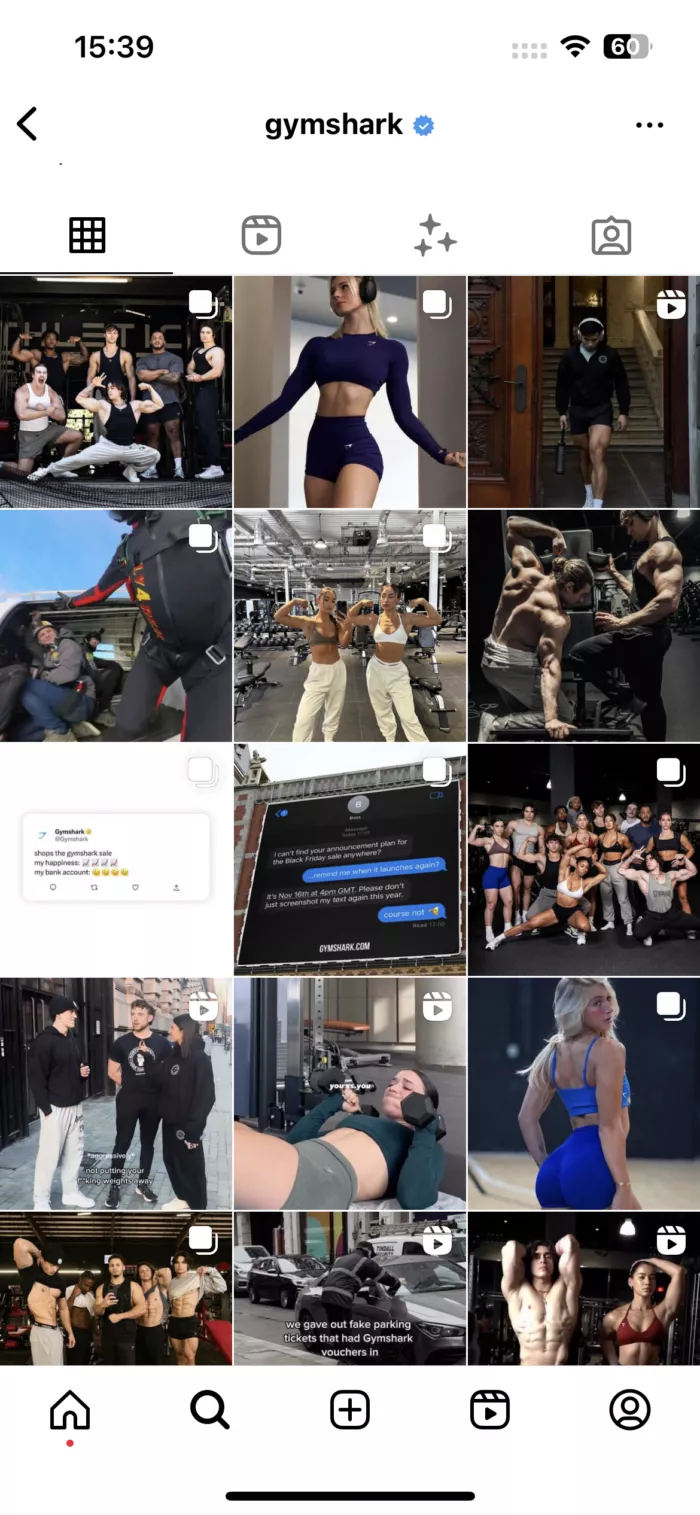
Which Platform for This Type
UGC can be featured across multiple marketing channels, including:
- Social media platforms
- Company blogs
- Website media sections
- Marketing materials
Potential Benefit
UGC offers several powerful benefits for businesses:
- Gets your product featured in authentic daily life scenarios
- Creates natural, unscripted testimonials that build trust
- Allows your brand to be part of larger story arcs
- Provides authentic reviews and experiences from real customers
- Creates a "small army" of people promoting your brand
- Helps achieve brand recognition and distribution
- Increases engagement with your target audience
The key to successful UGC is maintaining authenticity. The content should feel natural and unforced, focusing on real customer experiences rather than staged promotions. When done right, UGC becomes a powerful tool for building credibility and driving engagement through genuine customer advocacy.
Type of Social Media Marketing #7: Contests and Giveaways
What It Is?
Contests are a type of social media marketing that allow businesses to engage their followers and generate excitement around their products or services. You offer something free to your audience.
The core of this strategy is user-generated content (UGC), where participants create content (usually photos or videos) and share it on social media platforms.
Example to Illustrate Effectiveness
Catalyst Agents ran a "Street Photography Contest" on behalf of a real estate agent client, using the hashtag #SnapEastVan on Instagram. With just a $500 budget, the contest resulted in 41,000 impressions, demonstrating how an interactive contest can drive significant engagement without a large marketing budget.
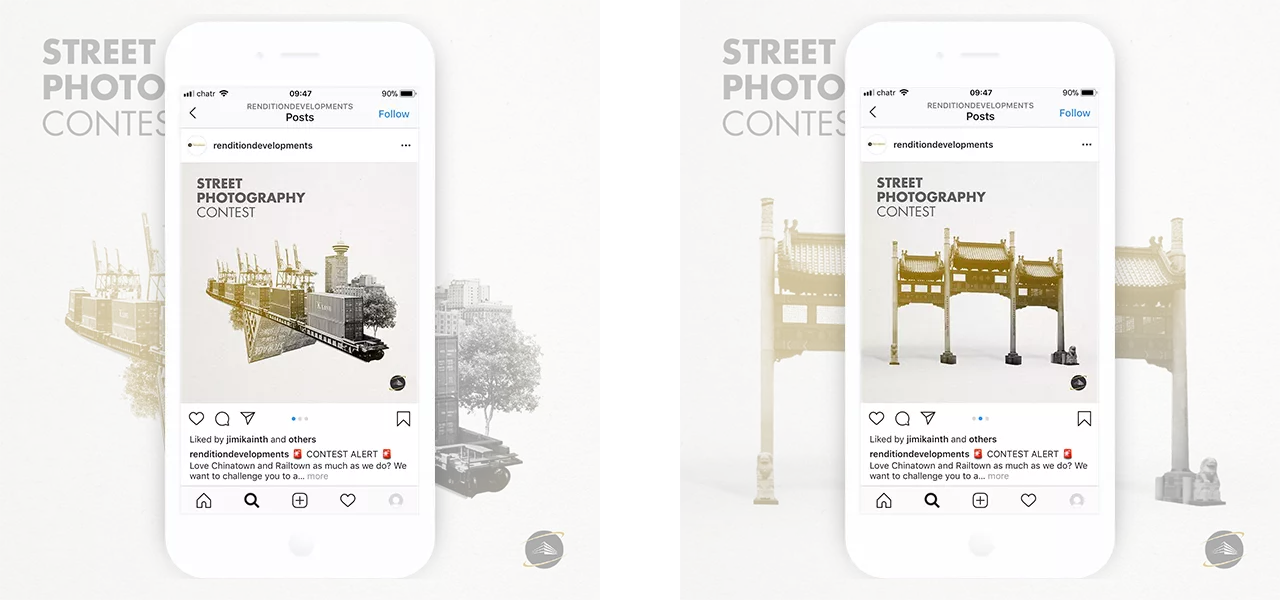

Best for Which Type(s) of Business?
This strategy works best for businesses that can strategically align their giveaway prizes with their target market. The key is offering something that not only attracts participants but attracts the right kind of participants - those who could become genuine customers. It works well for a variety of businesses, including:
- Retail and ecommerce brands looking to generate user-generated content and increase brand awareness
- Service-based businesses like real estate, restaurants, salons, etc. that want to connect with local communities
- B2C companies that want to build email lists, social media followers, or promote new products/services
The key is having a prize or incentive that aligns with your target audience's interests.
Which Platform for This Type The most common and effective platforms for social media contests are:
- Instagram - Highly visual platform perfect for photo/video contests
- Facebook - Allows easy contest promotion and participation through comments, shares, etc.
- Twitter - Contests with unique hashtags can gain traction and engagement
- TikTok - Short-form video contests work well on this rapidly growing platform
The specific platform should align with where your target audience is most active.
Potential Benefit Contests and giveaways can create a "small army" of engaged participants who help promote your brand. While they might not immediately drive sales, they can significantly boost brand recognition and distribution. They're particularly effective for building engagement and expanding your reach. In particular, the key benefits of running social media contests include:
- Increased brand awareness and engagement through user-generated content
- Expanded reach as participants share the contest with their own networks
- Opportunities to grow email lists, social media followings, and customer databases
- Valuable user insights and content that can be repurposed for other marketing
- Building a sense of community and excitement around your brand
Overall, social media contests can be a highly effective and relatively low-cost way to drive meaningful results for businesses of all sizes and types.
Type of Social Media Marketing #8: Live Streaming
What Is It
Live streaming is exactly what it sounds like - broadcasting live video content, but what makes it unique is that it's synchronous rather than asynchronous like regular videos. It offers a "different level of engagement" by creating a more direct, interactive experience for the audience.
Rather than watching a static video, live streams allow viewers to engage with the broadcaster in real-time.
Example to Illustrate Effectiveness
When doing a live stream, it becomes an event - something people anticipate and show up for. Like when someone announces "I'm going to be interviewing with this person at this time." This creates anticipation, with viewers looking forward to the upcoming stream, generating excitement as it approaches.
- Hosting Q&A sessions where the brand interacts directly with viewers, answering questions in real-time. This allows the brand to provide a more personalized experience and address customer concerns.
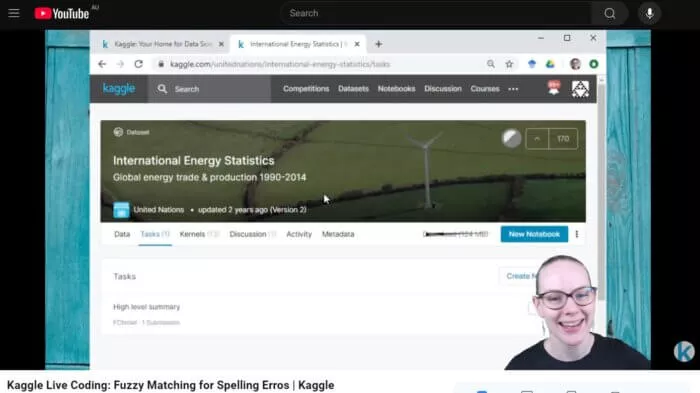
- Conducting product demonstrations live, rather than pre-recording. The live format enables the brand to showcase the product features dynamically, while also allowing viewers to ask questions.
- Interviewing industry experts or thought leaders on the brand's social channels. These live interviews create a sense of exclusivity and access, as viewers get to hear directly from respected figures in the space.
The common thread is that these live streaming examples prioritize interactivity and a sense of connection between the brand and its audience. Rather than a one-way broadcast, the live format facilitates a dialogue.
Best for Which Type(s) of Business?
Live streaming is particularly effective for brands in industries like fitness, education, entertainment, and B2B software.
These types of businesses tend to have audiences that value ongoing engagement, personalized experiences, and access to experts.
For instance, a fitness brand can use live workouts to build a loyal community of customers. An online education company can host live Q&As with instructors.
And a B2B software provider can offer live product demos and training sessions.
Growbo provides a productized service to other businesses. Our done-for-you service is like a project management software where you can delegate tasks to a team of human pros. If you want to check it out and learn more, go here.
One thing we do that's exactly similar to what we are saying here is in the past, we have done many live demo webinars, that are informational as well as demos of the actual productized service.
Which Platform for This Type
The top platforms for live streaming are Instagram, Facebook, and YouTube. These social networks have built-in functionality to support real-time broadcasts, with features like comment sections, viewer analytics, and replay options.
Choosing the right platform depends on where the target audience is most active. For example, fitness brands may find success on Instagram, while B2B companies could leverage LinkedIn or YouTube for live industry discussions.
Potential Benefit
The key benefits of live streaming include:
- Increased audience engagement: The interactive, event-driven nature of live streams encourages higher viewer participation and a stronger sense of connection.
- Enhanced brand loyalty: When done effectively, live streaming can help humanize the brand and make it feel more accessible and relatable to the audience.
- Boosted thought leadership: By hosting live interviews, Q&As, and demos, brands can position themselves as industry experts and trusted resources.
Ultimately, the live streaming format allows brands to build deeper relationships with their audience, which can translate to more loyal customers, greater brand advocacy, and even direct sales opportunities down the line.
Type of Social Media Marketing #9: Community Marketing
What It Is?
Community marketing is focused on marketing and messaging to your existing audience. It typically involves having a private group, like a Facebook group, where the relationship is stronger because it's not just a public like or public follow - it's a more select, exclusive group of followers.
Example to Illustrate Effectiveness
Spotify is an excellent example of effective community marketing. They have a dedicated X account called @SpotifyCares that responds to customer inquiries and issues within about an hour on average.
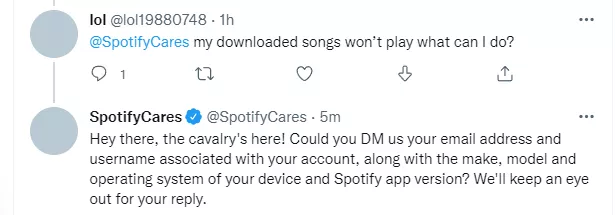
Spotify also proactively posts updates about app performance to keep customers informed. This level of responsiveness and transparency helps build trust and loyalty with Spotify's user base.
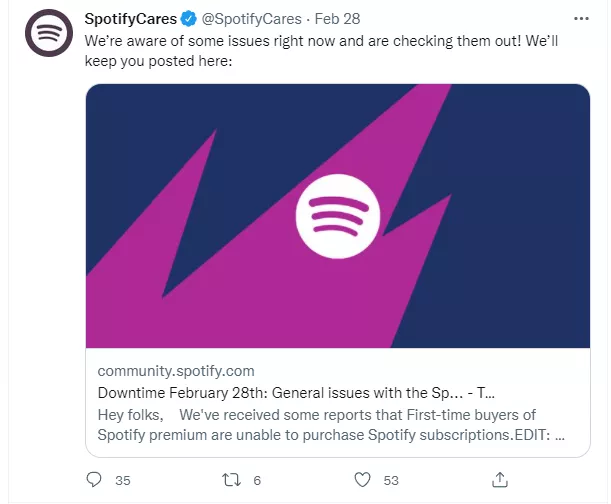
Best for Which Type(s) of Business?
Community marketing is beneficial for businesses of all sizes and industries that have an active customer base on social media. It's particularly valuable for:
- Consumer-facing brands with high customer engagement
- Businesses that rely on repeat business and customer loyalty
- Companies that want to gather real-time customer feedback and insights
- Organizations that need to quickly address customer service issues or concerns
Which Platform for This Type
The most common social media platforms used for community management include:
- X / Twitter - Ideal for quick customer service responses and real-time engagement
- Facebook - Allows in-depth conversations, content sharing, and community building in private Facebook groups
- Other private, more select groups where people must qualify to join
Potential Benefit
The key benefits of effective community marketing include:
- Creates stronger relationships with audience
- Allows for more direct marketing messages
- Messages are likely to resonate better because people know, like, or trust you more
- Works well for lower-funnel marketing (compared to other types that are typically top-of-funnel)
- More effective for direct sales pitches or offers
- Engages with people who have self-selected to be more involved with your brand
- Creates a more exclusive, selective environment
Community marketing is unique because it operates at a deeper level in the marketing funnel compared to other social media marketing types, making it particularly effective for more direct marketing approaches with an already engaged audience.
Long-Term Brand Sales Benefits of Social Media Marketing
Why Consistency Matters
Think of social media marketing like building any good relationship. You can't create strong connections after just one interaction. It takes time, regular engagement, and genuine interest to build trust. The same goes for brands on social media.
Getting Recognized and Remembered
When brands post regularly on social media, more people remember them. Just like we remember people we see often, customers remember brands that show up consistently in their feeds. Studies by Sprout Social show that regular posting makes brands 74% more recognizable.
Staying in People's Minds
HubSpot found that brands posting 3-4 times each week get noticed and remembered twice as much as those who post randomly. Interactive content (like polls or questions) holds the attention of the audience better. Videos and stories have proven especially powerful - people remember them 28% more than regular pictures.
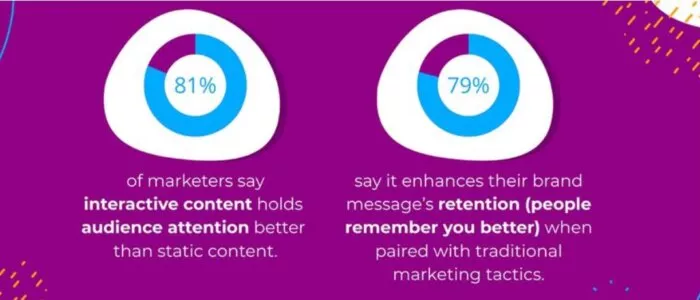
Building Trust Over Time
The more people see and interact with a brand, the more they trust it. Edelman's research shows that brands 82% of people trust more after following them for at least six months. This trust makes them 47% more confident about buying from the brand. It's like getting to know someone - the more you interact, the stronger the connection becomes.
The Big Picture
Regular social media activity works like compound interest - it grows more valuable over time. When brands consistently share useful content and engage with their followers, they turn casual observers into loyal fans. While it takes patience, the results last longer than quick, one-time campaigns.
Types of Social Media Marketing FAQs
Which type of social media marketing is best for my industry?
The choice depends on your business goals and target audience:
- B2B Services: Community marketing and organic content work well as they help establish expertise and build deeper relationships
- E-commerce: UGC and influencer marketing are effective as they showcase products through real users
- Professional Services: LinkedIn-focused organic content and paid promoted posts help reach decision-makers
- Consumer Brands: Mix of UGC, influencer marketing, and contests to build engagement
- Local Businesses: Community marketing and organic posting to maintain local presence
How do I measure ROI for different types?
Track these metrics based on your marketing type:
Paid Ads & Promoted Posts:
- Conversion rates
- Cost per acquisition
- Direct sales
Organic & Community Marketing:
- Engagement rates
- Growth in community size
- Customer retention rates
Influencer & UGC:
- Brand mention growth
- User engagement
- Content sharing rates
How frequently should each type be used?
Recommended frequencies by type:
Organic Posts:
- 3-4 times per week minimum
- Consistent daily posting ideal
Paid Ads:
- Test weekly, then scale successful campaigns
- Rotate creatives every 2-3 weeks
Community Marketing:
- Daily engagement
- Weekly exclusive content
UGC & Influencer:
- Monthly campaigns
- Quarterly major collaborations
How do I know which type to start with?
Consider these factors:
- Your current resources and budget
- Where your audience is most active
- Your immediate business goals
- Your team's expertise
- Available content creation capabilities
Can I use multiple types simultaneously?
Yes, but:
- Start with 1-2 types and master them first
- Ensure each type aligns with your goals
- Monitor performance to adjust strategy
- Don't spread resources too thin
- Focus on quality over quantity
Remember: The key is not to try everything at once, but to choose the types that best match your business goals and resources.
Conclusion
If you want to
As we've explored the nine essential types of social media marketing strategies, it's clear that success in today's digital landscape requires more than just posting content. From organic posting and influencer partnerships to video marketing and community building, each strategy offers unique advantages for engaging with your target audience and driving meaningful business results.
Here are the key takeaways from the article:
- Organic content remains the foundation of social media success, building trust and authority over time
- Video marketing and live streaming are becoming increasingly crucial
- User-generated content and influencer marketing provide authentic social proof that drives engagement
- Community marketing creates deeper relationships and stronger conversion opportunities
Here's the challenge: implementing these strategies typically requires hiring multiple specialists or agencies, costing $$$ and countless hours of management. That's where Growbo comes in — you can get all your marketing projects and tasks done by proven professionals all in one place.
Ready to transform your social media marketing? Try Growbo today for just $7 for 7 days. Experience firsthand how easy it can be to implement these strategies without the usual headaches of hiring and managing multiple team members.
We'd love to hear from you! Share your biggest social media marketing challenge in the comments below - is it content creation, consistency, or managing multiple platforms?
Keep Growin,’ Stay Focused,

Image credits:
- https://offers.hubspot.com/thank-you/social-media-trends-report?hubs_signup-url=offers.hubspot.com/social-media-trends-report&hubs_signup-cta=Submit&hubs_offer=offers.hubspot.com/social-media-trends-report
- https://www.marketingsherpa.com/article/chart/attracting-customers-to-use-brands-social-media
- https://sproutsocial.com/insights/user-generated-content-guide/
- https://theneuron.com/interactive-billboards-digital-out-of-home/


